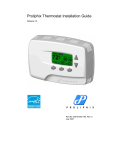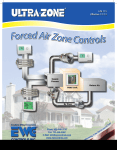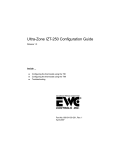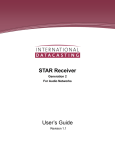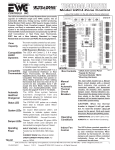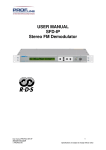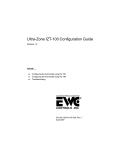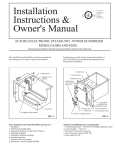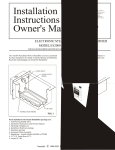Download Installation Manual
Transcript
Ultra-Zone Internet Zone Thermostat Installation Guide Release 1.0 Part No. 600-01100-100, Rev. 1 April 2007 Beta Draft Confidential Technical Support When contacting EWC Controls, Inc.® for technical assistance, please have the following information available: ! Product model and serial number. ! Type of heating/cooling system (example: gas, oil, or electric; warm air, hot water, heat pump, steam or hybrid). ! Location and number of wires attached to your Ultra-Zone™ thermostat. For additional assistance, please contact EWC Controls, Inc. Technical Support, 9:00 AM to 5:00 PM Eastern Standard Time Monday to Friday: Web: www.ewccontrols.com Email: [email protected] Telephone: 1-800-446-3110 Fax: 1-732-446-5362 Warranty Information EWC Controls, Inc. warrants its products to be free from manufacturing defects in materials and workmanship under normal use for a period of 1 year for the IZT-100 and the IZT-250 model thermostats from the date of purchase or the verifiable date of installation. EWC Controls Inc. shall not be liable to honor the terms of this warranty if the product has been used in any other application other than that for which it was intended, or if it has been subjected to misuse, accidental damage, acts of God, modification, or improper installation procedures. Furthermore, this warranty covers only products which have all original and unaltered markings and labels (serial numbers, model numbers, etc.) of manufacture. This limited warranty does not cover the repair of cracked, scratched, broken or modified plastics; other cosmetic damage; or parts that have been altered, defaced or removed; or the scratching, cracking or breakage of the product. This warranty is not transferable. THE FOREGOING WARRANTIES ARE THE SOLE AND EXCLUSIVE WARRANTIES EXPRESSED OR IMPLIED GIVEN BY EWC CONTROLS, INC. IN CONNECTION WITH THE PRODUCT, AND EWC CONTROLS, INC. DISCLAIMS ALL IMPLIED WARRANTIES, INCLUDING IMPLIED WARRANTIES OF MERCHANTABILITY, FITNESS FOR A PARTICULAR PURPOSE AND NONINFRINGEMENT OF THIRD PARTY RIGHTS. EWC CONTROLS, INC. DOES NOT PROMISE THAT THE PRODUCT IS ERROR-FREE OR WILL OPERATE WITHOUT INTERRUPTION. EWC CONTROLS, INC. WILL NOT BE LIABLE FOR INCIDENTAL OR CONSEQUENTIAL DAMAGES OR FOR ANY OTHER LOSSES, EXPENSES OR DAMAGES RELATING TO PRODUCT DEFECTS OR FAILURES. CUSTOMER'S SOLE REMEDY, AND EWC CONTROLS, INC.’S SOLE OBLIGATION, WITH RESPECT TO ANY PRODUCT DEFECTS OR FAILURES (REGARDLESS OF WHETHER YOUR CLAIM IS ASSERTED IN CONTRACT, TORT, STRICT LIABILITY OR OTHERWISE) SHALL BE (AT EWC CONTROLS, INC.’S SOLE OPTION) REPAIR OR REPLACEMENT OF A FAULTY MODEL. IN NO EVENT WILL EWC CONTROLS, INC.’S LIABILITY WITH RESPECT TO A PRODUCT, EXCEED THE PRICE PAID FOR SUCH PRODUCT. This warranty statement supersedes all previous warranties. This warranty extends to products purchased directly from an authorized Ultra-Zone™ dealer, wholesale distributor or agent. Material Return Procedure No merchandise may be returned for credit, exchange, or service without prior authorization from EWC Controls, Inc. To obtain warranty service for Ultra-Zone™ products, contact EWC Controls, Inc. Technical Support (1-800-446-3110) and request a Return Goods Authorization (RGA) number. Products may be returned for credit, exchange, or service with an EWC Controls, Inc. RGA number and with proof of purchase and installation date. Enclose a note explaining the symptoms of the problem, stating the RGA number, and the name, address and phone number of the company or individual contact. Authorized returns must be shipped prepaid to EWC Controls, Inc. at: EWC Controls, Inc. 385 Highway 33 Englishtown, NJ 07726 ii Ultra-Zone Internet Zone Thermostat Installation Guide, Release 1.0 Part No. 600-01100-100, Rev. 1 FCC Model: IZT-100 and IZT-250 Made in the USA This device complies with Part 15 of the FCC Rules. Operation is subject to the following two conditions: (1) this device may not cause harmful interference, and (2) this device must accept any interference received, including interference that may cause undesired operation. CSA Power: 24VAC 45mA 60Hz 48VDC 22mA 60Hz Switched power each contact: 24VAC 2A 60Hz Ultra-Zone Internet Zone Thermostat Installation Guide, Release 1.0 Part No. 600-01100-100, Rev. 1 iii Beta Draft Confidential iv Ultra-Zone Internet Zone Thermostat Installation Guide, Release 1.0 Part No. 600-01100-100, Rev. 1 Beta Draft Confidential Overview The Ultra-Zone Internet Zone Thermostats provide a rich set of innovative features including the ability to configure settings through a graphical interface either locally or from any remote location. The thermostats can be connected via secure wired Ethernet to a home, small business, or light commercial data network. This guide describes how to physically install the IZT-100 and IZT-250 thermostats. Any instructions or guidelines that apply to a specific thermostat model are noted within this guide. The following model-specific features are important to note during the installation: IZT-100 ! Supports HVAC system power with 24VAC. ! Dual-Stage Fuel Burner HVAC (2h/2c). ! Single-Stage Heat Pump HVAC with auxiliary heat (2h/1c). IZT-250 ! Supports HVAC system power with 24VAC. ! Two remote thermal sensors; either Analog or Thermistor on the IZT-250. ! Dual-Stage Fuel Burner HVAC (2h/2c). ! Dual-Stage Heat Pump HVAC with auxiliary heat (3h/2c). ! Independent alarm notification on external sensors. Installing the Thermostat This section describes the required tools, guidelines, and installation instructions for Ultra-Zone Internet Zone Thermostats. Caution Preventing electrostatic discharge (ESD) — Static electricity may cause damage to the components on the thermostat’s circuit module. Do not remove the thermostat from the protective bag until you are ready to install the thermostat. Required Tools The following tools are required to install the Ultra-Zone Internet Zone Thermostat: ! #1 or #2 Phillips head screwdriver. ! Drill with a 3/16” or 7/32” bit. Ultra-Zone Internet Zone Thermostat Installation Guide, Release 1.0 Part No. 600-01100-100, Rev. 1 1 Beta Draft Confidential Installation Guidelines Installation Guidelines Use the following guidelines to install the Ultra-Zone Internet Zone Thermostat: Tip Caution If you are replacing an existing thermostat, mount the Ultra-Zone Internet Zone Thermostat in the same location as the thermostat in which you are replacing. ! Install the thermostat on an inside wall, about 5 feet (1.5m) above the floor, and in a room that is used often. ! Install the CAT5/CAT5E/CAT6 cabling from the wiring center to the thermostat installation site. ! Install the thermostat in an area or room with adequate air circulation and where there are no unusual heating/cooling conditions, such as: sunlight, near a lamp, radio, television, radiator register, or fireplace; near hot water pipes in a wall; near a stove on the other side of the wall, on a wall separating an unheated room; or in a draft from a stairwell, door, or window; in a corner or alcove; or behind an open door. ! Install the unit after all construction work and painting is complete. ! Install the unit in an unobstructed location where there are no objects on the wall above or below the thermostat or other obstructions (such as furniture) restricting vertical airflow. ! It is not necessary for the thermostat to be level. Prior to installing or servicing the thermostat, turn off electricity to the entire HVAC system; do not turn electricity back on until all work is complete. Do not jumper wires together to test the system. This may cause harm to your HVAC system and damage the thermostat, and therefore void the warranty. All wiring must conform to local codes and ordinances. The distance between CAT5/CAT5E/CAT6 cables and HVAC cables should be a minimum of one inch. 2 Ultra-Zone Internet Zone Thermostat Installation Guide, Release 1.0 Part No. 600-01100-100, Rev. 1 Beta Draft Confidential Before you Begin Before you Begin If you are removing an existing thermostat, EWC recommends that you label each connection as you remove the wiring. You will use these same wires (and labels) when you connect the Ultra-Zone Internet Zone Thermostat (page 4). Use the following steps to remove an existing thermostat: 1 Turn off power to the entire HVAC system or the fuse/circuit breaker panel. 2 Remove the cover from the existing thermostat. If the cover does not snap off when pulled firmly from the top or bottom, check for a screw(s) that may be used to secure the cover. 3 Disconnect each wire. Label the wires with the terminal designation from the existing thermostat. Place the label about 1/2” away from the end of the wire to allow for stripping of the ends. Note: If this is a new installation, obtain the wire designations from the HVAC installer. Note 4 Remove the existing thermostat from the wall. Installing and Wiring the Thermostat This section describes a two-step installation process in which you install (or mount) the thermostat base plate and wire the thermostat. Installing the Base Plate Perform the following steps to mount the thermostat base plate on the wall: 1 Review the Installation Guidelines on page 2 and position the base plate in an appropriate location on the wall. Ensure the location allows you to access and pull the wires through the opening in the base plate. 2 Using a pencil, mark the center of the screw holes on the left and right side, and bottom center of the base plate. 3 Remove the base plate from the wall and drill three holes at the marked locations: for drywall, drill 3/16” holes; for plaster, drill 7/32” holes. 4 Gently tap the wall anchors (included in the packaging) into the drilled holes until they are flush with the wall. 5 Pull the wires through the base plate and position the base plate over the screw holes. 6 Attach the base plate to the wall using three 1" screws (included in the packaging). Ultra-Zone Internet Zone Thermostat Installation Guide, Release 1.0 Part No. 600-01100-100, Rev. 1 3 Beta Draft Confidential Installing and Wiring the Thermostat Wiring the Base Plate Terminals This section describes how to wire the base plate terminals. Fuel Burner HVAC Use the instructions in this section and refer to Table 1 and Figure 1 to wire the base plate for Fuel Burner HVAC. Refer to the labels you placed on the wires when you removed the existing thermostat (page 1). Table 1 lists the standard HVAC terminal label and the corresponding EWC label required to support the Single-Stage and Dual-Stage application. Table 1 a 4 Fuel Burner Terminal Conversion Chart Standard Terminal EWC Terminal IZT-100 and IZT-250 R, RH RH 24VAC source RC RC 24VAC source C C 24VAC commona W, W1 W1 Stage 1 heat relay Y, Y1 Y1 Stage 1 cool relay W2 W2 Stage 2 heat relay Y2 Y2 Stage 2 cool relay G G Fan relay - S1+ or CM Contact closure common (IZT-250 only) - H Contact closure, Normally Open or Normally Closed (IZT-250 only). See Table 7. The 24VAC common must be in the same AC phase as the 24VAC source (RH or RC). If the thermostat is connected to RH only, or RH and RC then C must be the RH common. If the thermostat is connected to RC only then C must be the RC common. Ultra-Zone Internet Zone Thermostat Installation Guide, Release 1.0 Part No. 600-01100-100, Rev. 1 Beta Draft Confidential Installing and Wiring the Thermostat Figure 1 shows an example of a Single-Stage (shown in yellow) and Dual-Stage (shown in blue) HVAC system connecting to an EWC base plate. Figure 1 Single/Dual Stage HVAC Connections HVAC System Square Hole Cool & Heat Power Fan Control Ca 2nd Stage Heat Control G 1st Stage Heat Control 2nd Stage Cool Control W1 Y2 1st Stage Cool Control Y1 W2 RH Wire EWC Base Plate 1 Use Table 1 to match the letter of your existing thermostat wire to the corresponding terminal letter on the EWC base plate. 2 Strip the wire insulation 3/8” (9.5 mm) from the wire ends. A strip gauge is provided on the base plate label. Verify that the wire ends are straight. To avoid damaging the labels, use caution when handling the wires and push any excess wire back into the wall. 3 Using Figure 1 as a guide, connect the labeled wires to the terminal post with the corresponding letter on the EWC base plate. For example, connect the wire labeled “W1” to the W1 terminal post. Loosen the terminal post screw used to secure the wires. Insert the wire straight down into the square hole and secure the corresponding screw to the wire. Caution 4 To avoid damage to the EWC base plate, stop unscrewing the terminal post screws when you feel a slight stop or resistance. Verify that the wire is securely attached to the terminal post in the base plate by gently tugging on the wire. Ultra-Zone Internet Zone Thermostat Installation Guide, Release 1.0 Part No. 600-01100-100, Rev. 1 5 Beta Draft Confidential Installing and Wiring the Thermostat Heat Pump HVAC Use the instructions in this section to wire the base plate terminals for Heat Pump HVAC. Note You must know the type of Reversing Valve (RV) in your heat pump. See the user manual for your heat pump for more information. To wire the base plate terminals for Heat Pump HVAC, refer to the labels you placed on the wires when you removed the existing thermostat (page 1). Use Table 2 and Figure 2 and Table 3 and Figure 3 to complete the wiring. Table 2 lists the standard HVAC terminal label and the corresponding EWC label required to support the Single-Stage Heat Pump application. Table 2 a 6 Single-Stage Heat Pump Terminal Conversion Chart Standard Terminal EWC Terminal IZT-100 and IZT-250 R, RH RH 24VAC source RC RC 24VAC source C C 24VAC commona W, W1 W1 Auxiliary heat relay Y, Y1 Y1 Compressor relay B W2 RV activate for heat relay O Y2 RV activate for cool relay G G Fan relay - S1+ or CM Contact closure common (IZT-250 only) - H Contact closure, Normally Open or Normally Closed (IZT-250 only). See Table 7. The 24VAC common must be in the same AC phase as the 24VAC source (RH or RC). If the thermostat is connected to RH only, or RH and RC then C must be the RH common. If the thermostat is connected to RC only then C must be the RC common. Ultra-Zone Internet Zone Thermostat Installation Guide, Release 1.0 Part No. 600-01100-100, Rev. 1 Beta Draft Confidential Installing and Wiring the Thermostat Figure 2 shows an example of a Single-Stage Heat Pump HVAC system, with a “B” type reversing valve connecting to an EWC base plate. Figure 2 Single-Stage Heat Pump HVAC Connections HVAC System Square Hole Cool & Heat Power Fan Control Reverse for Heat “B” W2 Auxiliary Heat Compressor W1 Y1 G RH Wire Ca EWC Base Plate Note: A heat pump is either a reverse for heat “B” or reverse for cool “O” model. The Ultra-Zone IZT-100 uses Y2 for reverse cool and W2 is used for reverse heat. Ultra-Zone Internet Zone Thermostat Installation Guide, Release 1.0 Part No. 600-01100-100, Rev. 1 7 Beta Draft Confidential Installing and Wiring the Thermostat Table 3 lists the standard HVAC terminal label and the corresponding EWC label required to support the Dual-Stage Heat Pump application. Table 3 Dual-Stage Heat Pump Terminal Conversion Chart Standard Terminal EWC Terminal IZT-250 R, RH RH 24VAC source RC RC 24VAC source C C 24VAC commona W, W1 W1 Auxiliary heat relay Y, Y1 Y1 Compressor relay stage 1b B, O W2 RV activate for heat/cool relayc Y2 Y2 Compressor relay stage 2d G G Fan relay - S1+ or CM Contact closure common - H Contact closure, Normally Open or Normally Closed. See Table 7. a The 24VAC common must be in the same AC phase as the 24VAC source (RH or RC). If the thermostat is connected to RH only, or RH and RC then C must be the RH common. If the thermostat is connected to RC only then C must be the RC common. b Provides stage 1 heat or cool depending on the activation of the RV. 8 c The RV is either activate for heat (B terminal) or activate for cool (O terminal). You can program this function on the relay output through the web interface and the LCD screens. Consult your HVAC installer about the RV type for your heat pump. d Provides stage 2 heat or cool depending on the activation of the RV. Ultra-Zone Internet Zone Thermostat Installation Guide, Release 1.0 Part No. 600-01100-100, Rev. 1 Beta Draft Confidential Installing and Wiring the Thermostat Figure 3 shows an example of a Dual-Stage Heat Pump HVAC system, with reversing valve activated for heat or cool, connecting to an EWC base plate. Figure 3 Dual-Stage Heat Pump HVAC Connections HVAC System Square Hole Cool & Heat Power Fan Control G Reverse for heat/cool (Dual-Stage) W2 Auxiliary Heat Compressor 2 (Dual-Stage) W1 Y2 RH Compressor 1 (Single-Stage) Y1 Wire 1 C EWC Base Plate Configuring Remote Sensors for the IZT-250 The Ultra-Zone Internet Zone Thermostats provide two remote (external) sensor ports. This release supports Analog and Thermistor sensors (go to www.ewccontrols.com for a complete list of supported sensors). Analog sensors convert temperature measurements as Fahrenheit degrees to a voltage which can be sensed by the thermostat. Analog sensors are active devices which require power from the thermostat. The Analog sensor is polarized and must be connected as shown in Table 4. Thermistor sensors are passive devices which represent thermal measurements as electrical resistance. Thermistors do not require power from the thermostat. The Thermistor sensor is not polarized; either lead can be connected as shown in Table 4. Ultra-Zone Internet Zone Thermostat Installation Guide, Release 1.0 Part No. 600-01100-100, Rev. 1 9 Beta Draft Confidential Installing and Wiring the Thermostat Table 4 lists the external sensor port Analog and Thermistor connections. Only one sensor can be connected to each port. Table 4 Remote Sensor Port Connections EWC Terminal Analog Sensor Thermistor Sensora Contact Closure Sensor S1+ Do Not Use Do Not Use Do Not Use S1- COM Sensor 1, Either lead Contact Closure 1, Either lead S1 T20 Sensor 1, Either lead Contact Closure 1, Either lead S2+ or S+ +V for S1 and S2 sensors Do not use Do not use S2- COM Sensor 2, Either lead Contact Closure 2, Either lead S2 T20 Sensor 2, Either lead Contact Closure 2 Either lead a Do not connect either lead to the S1+, S2+ or S+ terminal when using a Thermistor sensor. Connecting CAT5/CAT5E/CAT6 Wiring for Ethernet Networks The label located on the inside of the base plate (see Figure 4) shows several color-coded wiring schemes for Ethernet CAT5/CAT5E/CAT6 connections. To wire the Ethernet network, refer to Figure 4 and match the label number to the EWC base plate number for CAT5/CAT5E/CAT6 color coding. Caution All wiring must conform to local codes and ordinances. The distance between CAT5/CAT5E/CAT6 cables and HVAC cables should be a minimum of one inch. Figure 4 shows an Ethernet CAT 5 wiring example. Figure 4 10 Ethernet CAT5/CAT5E/CAT6 Wiring T568A T568B 1 2 3 4 5 6 1 2 3 4 5 6 White-blue and blue ends stripped and twisted White-brown and brown ends stripped and twisted White-green Green White-orange Orange White-blue and blue ends stripped and twisted White-brown and brown ends stripped and twisted White-orange Orange White-green Green Ultra-Zone Internet Zone Thermostat Installation Guide, Release 1.0 Part No. 600-01100-100, Rev. 1 Beta Draft Confidential Installing and Wiring the Thermostat Figure 5 shows the RJ-45 Ethernet plug pinout assignments for the T568A and T568B wiring standards. Figure 5 RJ-45 Ethernet Plug Pinout Assignments for T568A and T568B T568A T568B Table 5 describes the pinout assignments for the T568A and T568B wiring standards. Table 5 T568A and T568B Pinout Assignments Pin Number T568A Wire Color T568B Wire Color 1 2 3 4 5 6 7 8 Green/White Green Orange/White Blue Blue/White Orange Brown/White Brown Orange/White Orange Green/White Blue Blue/White Green Brown/White Brown Mounting the Thermostat into the Base Plate The Ultra-Zone Internet Zone Thermostat contains jumpers to configure the HVAC power settings. The power settings determine which HVAC power source (RH or RC) is configured to turn on each HVAC system (cool, heat and fan). Most applications use only RH power. The Ultra-Zone Internet Zone Thermostat is shipped from the factory with the “RH Only” configuration. Table 6 lists the possible HVAC power configurations. RC and RH are connected with J1 inserted. Table 6 HVAC Power Configuration HVAC Power Configuration J2 J1 RH only (default) – Supplies W1, W2, Y1, Y2, G POS1 IN RC only – Supplies W1, W2, Y1, Y2, G POS1 IN RH and RC – RH supplies W1, W2, G and RC supplies Y1 and Y2 POS1 OUT RH and RC – RH supplies W1 and W2 and RC supplies Y1, Y2, G POS2 OUT Ultra-Zone Internet Zone Thermostat Installation Guide, Release 1.0 Part No. 600-01100-100, Rev. 1 11 Installing and Wiring the Thermostat Beta Draft Confidential The general purpose contact closure can be configured for Normally Open or Normally Closed. The contact closure will be in these states upon power failure or deactivation of an event. Table 7 shows the configuration of jumper J9. Figure 6 shows the location and positions of jumper J9 on the IZT-250. Table 7 Contact Closure Configuration for Jumper J9 Configuration J9 Pins Normally Closed POS1 Top and middle Normally Open POS2 Middle and bottom Figure 6 shows the location of the jumpers on the thermostat circuit module. The jumper in J2 supports an Up (POS1) or Down (POS2) position. The example in Figure 6 shows the J2 jumper in the Up position. If necessary, move the jumper downward to the POS2 position. Figure 6 Thermostat Jumper Locations Prior to mounting the thermostat into the base plate, verify that the jumpers on the thermostat are configured for your application (see Table 6). To mount the thermostat into the base plate: 12 1 Mount the thermostat into the base plate (see page 3) by inserting the top two hinges into the corresponding receptacle holes in the top of the base plate. 2 Snap the bottom of the thermostat securely into the base plate. Ultra-Zone Internet Zone Thermostat Installation Guide, Release 1.0 Part No. 600-01100-100, Rev. 1 Beta Draft Confidential Installing and Wiring the Thermostat Verifying the Thermostat’s Operating Status This section describes the procedures you can use to verify that the heat, cool, and fan controls are operating properly on your thermostat. Before you begin, verify that the HVAC system’s power is set to “On” and press HVAC on the thermostat panel. Testing the Heat Controls 1 Press HVAC. 2 Press Mode. A menu list appears. 3 Use the Up and Down arrows on the right side of the panel to select Heat. 4 Press Select. 5 Press Back. 6 Continuously press the Up arrow until the heat set point is higher than the temperature reading. The heat relay should click and the HVAC system should activate the heat. Testing the Cool Controls 1 Press HVAC. 2 Press Mode. A menu list appears. 3 Use the Up and Down arrows on the right side of the panel to select Cool. 4 Press Select. 5 Press Back. 6 Continuously press the Down arrow until the cool set point is lower than the temperature reading. The cool and fan relays should click and the HVAC system should activate the cool and fan. Testing the Fan Operation 1 Press HVAC. 2 Press Fan. A menu list appears. 3 Use the Up and Down arrows on the right side of the panel to select On. 4 Press Select. The fan relay should click and the fan should turn on. Ultra-Zone Internet Zone Thermostat Installation Guide, Release 1.0 Part No. 600-01100-100, Rev. 1 13 Logging In to the Thermostat Via your PC Beta Draft Confidential Logging In to the Thermostat Via your PC Log in to the TMI as the Administrator as follows: 1 Assign an IP address to your new thermostat via your DSL or Broadband Router. 2 Enter the IP address into the address bar on your Internet browser. 3 Enter the username: admin 4 Enter the password: admin (default) See the Ultra-Zone IZT-100 Configuration Guide for more information. What’s Next? Tip After you install the thermostat, continue with the Configuration Guide to configure thermostat settings and the Remote Management Guide to manage the thermostat remotely via the EWC Remote Management server. You can access these guides at www.ewccontrols.com in the User Manuals area. Troubleshooting Use Table 8 to troubleshoot potential issues with your thermostat. Table 8 Troubleshooting Tips Condition Possible Cause LCD display is blank ! Verify that the Common from the primary transformer source (either RH or RC) is connected to the C terminal. ! Either RH or RC (24v source) must be connected. ! Verify the HVAC system is powered on. ! Verify you increased the heat set point higher than the temperature reading and the thermostat is in heat mode (see page 13). ! Verify the HVAC system is powered on (page 13). ! Verify you decreased the cool set point lower than the temperature reading and the thermostat is in cool mode (see page 13). ! Verify the HVAC system is powered on (page 13). ! Check the base plate wiring (see page 4 or page 6). ! Verify the HVAC system is powered on (page 13). HVAC heat does not activate when tested HVAC cool does not activate when tested HVAC fan does not activate when tested 14 Ultra-Zone Internet Zone Thermostat Installation Guide, Release 1.0 Part No. 600-01100-100, Rev. 1


















